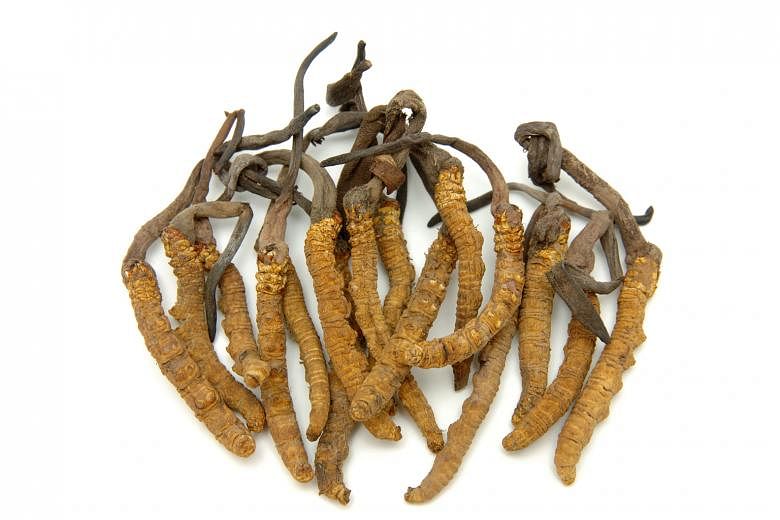The safety of Chinese medicine was thrust into the spotlight recently when a 58-year-old woman died after developing extensive bleeding in the brain.
Last month, State Coroner Marvin Bay attributed Madam Chew Kim Kee's death last year to her failure to tell doctors that she had been taking cordyceps in the week before the operation for a benign brain tumour.
Cordyceps contain adenosine, which may impede blood platelets from clumping together and forming a plug - the first step in stopping bleeding.
This risk of bleeding is a concern for patients undergoing any medical procedures.
Associate Professor Linn Yeh Ching, senior consultant at Singapore General Hospital's (SGH) department of haematology, said herbs may contain active compounds that either suppress the function of platelets, lower the platelet count or reduce clotting factors - proteins that are activated when a person bleeds in order to seal up the bleeding site.
Prof Linn added that a patient's platelet counts and clotting function are routinely measured before medical procedures, but not the function of platelets, which is suppressed by drugs like aspirin.
"If there is any suspicion of a herb suppressing platelet counts, the platelet count should be repeated a few weeks after stopping the herb," she said.
Some herbs that have been shown to suppress one's platelet function include radix salviae miltiorrhizae (danshen), radix notoginseng (tianqi), garlic extract (not garlic used in small amounts in cooking) and codonopsis root (dangshen), she said.
It is why patients must stop taking these herbal products for between 10 and 14 days prior to a procedure. This is to ensure that platelets exposed to the herbal products have died and are completely replaced by newly-formed platelets. The lifespan of a platelet is about 10 days.
Ms Lim Ching Hui, SGH's senior principal pharmacist, said herb- drug interactions can occur if a patient takes both at the same time and they react with one another.
"These interactions may augment the action of the drug, reduce its effectiveness or cause unexplained side effects."
The interactions can even alter the absorption, distribution, metabolism and excretion of the drug which, in turn, affect the drug concentration in the body.
This can have unintended consequences.
For instance, if herbs interacted with a diabetic drug and resulted in a low drug concentration, it could result in poorer control of blood sugar level.
If it interacted with a drug intended to decrease blood pressure such that the concentration is high, it could cause a greater-than- expected decrease.
Often, more than one herb or drug is involved in the interaction.
Ms Lim said it can be difficult to determine the main causative agent, especially when a herbal product contains multiple ingredients, or when a single herb contains numerous organic and inorganic compounds.
Ms Lim said that taking a herb and drug at two different times of the day can help reduce direct interactions in the digestive tract, but it will not affect how the body responds, such as how the drug is broken down in the body.
Besides cordyceps, other Chinese herbs which have blood- thinning effects include Szechwan lovage rhizome (chuanxiong), radix salviae miltiorrhizae (danshen), safflower (honghua), red peony root (chishao) and motherwort herb (yimucao), said Ms Lim Lay Beng, a traditional Chinese medicine (TCM) practitioner at YS Healthcare TCM Clinic.
As such, TCM practitioners are cautious about prescribing these herbs to patients who are taking anti-coagulants such as aspirin or warfarin for fear of the increased risk of bleeding, she added.
But if these are deemed necessary for the patient, she will include other herbs to minimise the blood-thinning effect of the overall prescription.
Ms Lim said: "A prescription is usually made up of a combination of various herbs that not only boosts the efficacy of the treatment, but also minimises the side effects of certain herbs."
Such prescriptions are drawn up after taking into consideration a patient's unique body constitution and medical conditions.
In addition, TCM physicians typically start patients on low doses of herbs to monitor their reaction, she said.
There is limited information on herb-drug interactions in medical literature.
TCM practitioners also warn the public to consult qualified physicians before consuming any herbs.
Dr Clement Ng, a volunteer TCM physician at Singapore Chung Hwa Medical Institution, said all food - including herbs - has distinct properties that either help to balance our bodies and make us healthy or create imbalances which ultimately result in sickness.
It is why people should be aware that even supplements - herbal or otherwise - are regarded as medicine, albeit taken at a lower dosage.
He stressed that people should be educated to avoid self-medication of herbs.
Patients who choose to withhold information of prior illnesses and medication taken when seeking consultation or surgery are solely responsible for the outcome, he added.
"This applies to both mainstream medicine as well as TCM."

